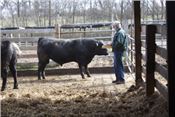UT Bull Test Center Enhances Evaluations With DNA Testing
 A visitor to the UTIA Bull Test Center makes notes on
A visitor to the UTIA Bull Test Center makes notes on
one of the performance-tested bulls. The Center's Open House is
scheduled for Thursday, December 10, from 9:30 a.m. - 1:30 p.m.
Guests can view all bulls on the test and attend educational
presentations, including a discussion of new DNA testing.
Photo by G. Rowsey, courtesy UTIA
SPRING HILL, TENN.
DNA testing for all animals will now be included as part of the standard evaluations at the University of Tennessee Institute of Agriculture’s Bull Test Center. According to experts, DNA tests provide valuable information about young animals that could improve the accuracy of genetic predictions. With increased accuracy, cattle producers can make better breeding and management decisions and increase the value of their herds.
“This concept really provides producers a jumpstart on how these bulls’ offspring would perform for a number of economically important beef cattle traits,” says David Kirkpatrick, UT Extension Beef Cattle Specialist. “This test provides as much additional information on the individual bull as if he had already produced from 10 to 15 head of progeny that have performance records.”
Each year university researchers evaluate more than 100 yearling bulls at the Bull Test Center, located at the Middle Tennessee AgResearch and Education Center. They measure weight gain and frame size, test for reproductive soundness, and collect Expected Progeny Differences (EPDs), which are indicators of the genetic value of one bull compared to another bull of the same breed. Bulls that pass the test’s standards are sold at public auction.
Researchers say the addition of DNA testing will greatly enhance the EPDs. This is good news for potential buyers who will now have more precise information about the genetics available at the sales. The DNA testing also qualifies each bull for an extra cost share from the Tennessee Ag Enhancement Program.
More than 150 bulls are currently entered in the performance test. They can be observed at the upcoming Bull Test Open House on Thursday, December 10. The open house begins at 9:30 a.m. CST with an educational program that includes a discussion of designing genetics and selection for feedstock and commercial cattlemen. Additional presentations will also cover bull fertility and replacement heifer programs.
The Open House will conclude with a complementary lunch. For more information, including directions to the Middle Tennessee Center, visit https://ag.tennessee.edu/AnimalScience/Pages/BullTestProgram.aspx or call 931-486-2129.
The Senior Bull Test sale is scheduled for January 21, 2016. The Junior Bull Test Sale will take place on March 10, 2016. Featured breeds include Angus, Hereford, SimAngus and Simmental. ∆